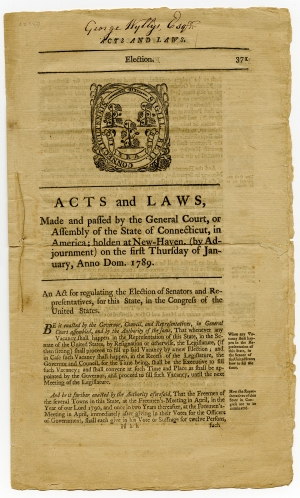|
Connecticut Prepares for New Federal Constitution, Establishes Plan to Elect Senators and Representatives |
Click to enlarge:

Select an image:
Official printing of the fourteen Acts passed by the Connecticut Assembly in January 1789, includes “An Act for regulating the Election of Senators and Representatives, for this State, in the Congress of the United States.”
[CONNECTICUT]. GEORGE WYLLYS.
Printed Document Signed.
Acts and Laws, Made and passed by the General Court, or Assembly of the State of Connecticut, in America: holden at New-Haven, (by Adjournment) on the first Thursday of January, Anno Dom. 1789. New Haven: Thomas and Samuel Green, 1789. Signed on first page, and docketed by Wyllys on final page, “
Public Acts / Assembly / Jan’y 1789.” 8 pp., 7 ⅜ x 12 ½ in.
Inventory #24404
Price: $3,750
Before the first federal United States Congress could convene, the states had to elect senators and representatives. This Act of the Connecticut Assembly empowered the legislature to elect two United States senators. If the legislature was not in session, the governor and council could fill the vacancy until the next meeting of the legislature. The freemen of each of the towns were to nominate twelve men, and the twelve persons with the greatest number of votes would stand for election. The five who received the most votes would represent Connecticut in the U.S. House of Representatives.
Seven states decided to elect representatives by district. Delaware and Rhode Island had only one representative each, and Connecticut, New Hampshire, New Jersey, and Pennsylvania chose to elect delegates at-large.
The Connecticut Assembly selected Oliver Ellsworth and William S. Johnson, both signers of the Constitution, as the state’s first U.S. Senators. Voters elected Benjamin Huntington, Roger Sherman, Jonathan Sturges, Jonathan Trumbull Jr., and Jeremiah Wadsworth as Connecticut’s first representatives in the U.S. House of Representatives. Four of them had served in the Continental Congresses, and Sherman had also signed the U.S. Constitution.
Other acts passed by the Connecticut legislature at this session include those establishing the form of oaths of office, suspending all suits brought in favor of citizens of Rhode Island (in retaliation for a similar statute passed by RI in March 1787), revising the times and places for holding courts, encouraging woolen manufactures, and revising the manner of settling estates. Additional laws governed the actions of treasurers and town clerks, incorporated a part of Hartford, and made minor modifications to the scheduling of elections and calling of jurors. The legislature also prevented anyone from holding the office of U.S. Senator or Representative from also serving as a Judge of Connecticut’s Superior Court at the same time.
While most of the former colonies had adopted new state constitutions by 1786, Connecticut continued to be governed by its 1662 charter from King Charles II, so far as it was consistent with independence. Connecticut did not adopt a state constitution until 1818.
Pagination of the Acts and Laws of the State of Connecticut, in America began with those published in 1784 (through page 265), and subsequent laws passed in May 1784 (267-307), October 1784 (309-15), May 1785 (317-28), October 1785 (329-36), May 1786 (337-46), October 1786 (347-50), May 1787 (351-54), October 1787 (355-58), May 1788 (359-66), October 1788 (367-70), and then this set for January 1789 (371-78), followed by May 1789 (379-82).
George Wyllys (1710-1796) was the great grandson of George Wyllys (1590-1645) who had served as colonial governor of Connecticut in 1642-1643. The younger Wyllys graduated from Yale College in 1729, and held several public offices, including town clerk of Hartford (1732-1796) and officer in the militia. He succeeded his father as Secretary of the colony and later the state of Connecticut, serving for 61 years (1735-1795).
Evans 21748, calling this “the official issue.”
Condition
Stitched as issued. Four leaves folded and numbered 371-378, uncut.